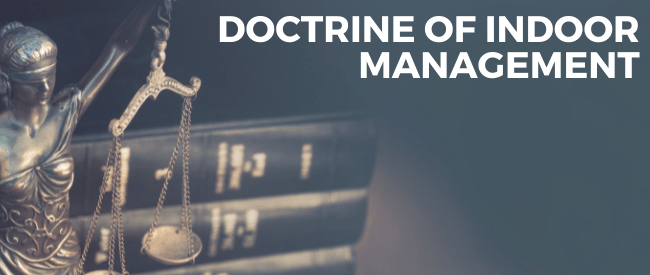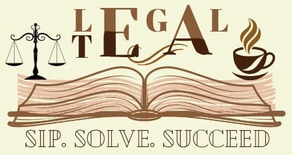Doctrine of Indoor Management: Protecting Outsiders in Company Dealings
The Doctrine of Indoor Management protects people who transact with companies that may not have the means or necessity to verify that internal procedures were properly executed. The Doctrine of Indoor Management provides safeguarding mechanisms to outsiders involved in company transactions. The Doctrine of Indoor Management safeguards outsiders who transact with a company in good faith, while internal procedures may not always be completely correct.
Aniket Chakraborty, 3rd year BA LLB Hons. at Lovely Professional University
4/22/20253 min read


Modern business operations require this legal principle to protect outsiders who rely on companies for their financial transactions. We must first learn about the opposite principle, namely the Doctrine of Constructive Notice, before moving on to the indoor management rule. This doctrine applies against anyone who does business with a company based on reading its publicly disclosed Memorandum of Association (Moa) and Articles of Association (Aoa). Flushing through corporate documentation before business transactions remains a practice that few people practice.
The nature of this doctrine proves disadvantageous to external parties in business transactions. Judicial bodies thought it necessary to introduce an official exception to this rule. The judicial precedent that became known as Royal British Bank v. Turquand (1856)1. The directors of this company obtained financing, although company policies mandated a specific formal resolution, which never received executive approval. The bank extended the loan, believing that normal board procedures had been executed, although no such formalities occurred. The court granted authority to the bank to rely on the assumption that all necessary official procedures had been completed. As a result, the firm needed to pay back the initial debt. The court established an important precedent since it confirmed that outsiders must not bear the consequences when employees breach internal procedures.
Indian judicial systems firmly endorse this rule in their decisions. The Lakshmi Ratan Cotton Mills Co. Ltd. v. J.K. Jute Mills Co. Ltd. (1957) 2 court case demonstrates this principle. The company manager obtained financing from a lender who received no consequences even though the process lacked strict internal approval. According to the court, you can believe that decisions made by authoritative people are valid unless specific suspicions arise. But there's a limit. In Anand Bihari Lal v. In Dinshaw & Co. (1942)3, an accountant of the company attempted to move a piece of property. Because accountants are not allowed to carry out such transactions, the court blocked the other side from putting forward this doctrine. The principle is not applicable if you have established that the individual presented no convincing authority in the arrangement. When you conduct business operations with a company, which seems fine, everything looks suitable. You are communicating with someone who serves as the manager of the organisation, while the documentation appears suitable. The discovery reveals that the board did not offer formal approval for whatever it was.
Let’s say you’re doing business with a company and everything looks normal. The person you’re talking to is a manager, and the paperwork seems fine. Later, you find out the board hadn’t officially approved something. Under the Doctrine of Indoor Management, you're still protected, as long as:
• The deal isn’t something the company legally can’t do (like issuing shares illegally).
• You didn’t know something was wrong.
• The person you dealt with appeared to have the authority.
But the protection won’t work if:
• You did know about the internal issue.
• You ignored something suspicious
• The document was forged (forgery is never protected under this rule).
In Ruben v. Great Fingall Consolidated (1906)4 discovered an invalid signature was discovered on one of its share certificates. According to the court, the firm should not bear liability since no legal principle can validate a forgery. This rule is practical. Business outsiders do not have sufficient time or access to verify all the internal decision-making activities within companies. The concept provides external stakeholders with mental comfort. Smooth business relationships develop through this approach because it promotes trust between parties. Business organisations would escape their obligations by pointing to internal errors if this rule did not exist. The doctrine appears extraordinary to students because it strikes the perfect balance of fairness between different parties.
The doctrine protects people who had no intentional awareness of problems. The doctrine assigns responsibility to corporations for their established systems while maintaining unbiased due process for all company members. This business principle holds greater significance today because it protects external parties from loss in corporate activities. Mistakes from businesses should not result in outside losses because outsiders demonstrate their sincerity in following the rules. Corporate law heavily depends on the application of the Doctrine of Corporate Management to function properly. External parties who interact with the company remain protected from economic loss occurring due to internal organisational faults. Through this doctrine, limited liability protection extends toward people who depend upon corporate appearances and good faith behaviour. Outsiders cannot use the principle as complete protection because they must maintain proper behaviour while identifying warning signs. Proper application of this principle helps maintain business operations in combination with ensuring companies follow equitable standards.
Footnotes:
1. Royal British Bank v Turquand (1856) 6 E&B 327.
2. Lakshmi Ratan Cotton Mills Co. Ltd. v J.K. Jute Mills Co. Ltd. AIR 1957 All 311.
3. Anand Bihari Lal v Dinshaw & Co. (1942) 12 Comp Cas 52 (Lah).
4. Ruben v Great Fingall Consolidated (1906) AC 439.
Because Every Legal Mind Deserves a Great Conversation.
Legaltea.in@gmail.com
+91 6284295492
MSME Certified
© 2025 Legal Tea. All rights reserved.


